Senate ‘ready’ to pass pending tax reform packages within 15-18 months

Finance Secretary Carlos G. Dominguez III. Photo courtesy of DOF
MANILA, Philippines — The Senate is “ready” to heed the call of Finance Secretary Carlos G. Dominguez III to pass the remaining packages of the comprehensive tax reform program within 15-18 months.
“I’ve always been a hard worker and my main job is to provide the information that my colleagues need to have to be able to make informed decisions. So I’m ready to do it,” Senate ways and means committee chair Pia Cayetano told the Inquirer in a chance interview Wednesday when asked if the Finance chief’s timetable was doable.
“Fifteen to 18 months – if you have regular hearings, that’s a good time. But I don’t want to give the impression to my colleagues that I’m rushing them. I want them to know that I will be available to have these hearings. And I know the DOF [Department of Finance] has made themselves available to give technical briefings outside of the hearings,” Cayetano said.
Last week, Dominguez said DOF wanted the pending tax reform packages tackled in Congress and passed within the next 15-18 months – before legislators get busy with their preparations for the 2022 national elections.
“That is our target because realistically speaking once you hit 2021, you just look at what happened in 2015 – everybody starts focusing on something else,” said Dominguez, who heads the Duterte administration’s economic team.
“This is the reality we have to face, so we have to finish this thing [tax reform] by 15-18 months,” Dominguez added.
The pending tax reform packages had already been refiled in the 18th Congress by House ways and means committee chair and Albay Rep. Joey Salceda, Camarines Sur Rep. LRay Villafuerte, and Quirino Rep. Junie Cua, as tax measures had to emanate from the lower chamber.
The remaining packages included package 1C on raising the motor vehicle user’s charge coupled with lifting bank secrecy and automatic exchange of information to implement general tax amnesty; package 2, earlier known as the Tax Reform for Attracting Better and High-Quality Opportunities (Trabaho) bill, on reducing corporate income tax rates while rationalizing investors’ fiscal incentives; package 2 plus for higher excise taxes on alcoholic products, heated tobacco and vapor products; package 3 on reforming the property valuation system; and package 4 on capital income taxation.
So far, President Rodrigo Duterte green-lighted three tax packages, the first of which was the Tax Reform for Acceleration and Inclusion (Train) Act that took effect last year.
Train Law slashed personal income tax rates but jacked up or slapped new excise taxes on consumption of cigarettes, oil, sugary drinks, motor vehicles, and cosmetic procedures, among other goods and services.
In February, the President signed into law package 1B under Republic Act (RA) No. 11213 or the Tax Amnesty Act of 2019, which paved the way for the ongoing estate tax and delinquencies amnesties.
Last month, Duterte also signed RA 11346, which further jacked up cigarette excise taxes and imposed new levies on e-cigarettes and vapes.
The proposal for a comprehensive tax reform program was first espoused by Dominguez’s predecessor Cesar V. Purisima, who before the end of the Benigno S. Aquino III administration pitched the DOF’s plan, only to be rejected, as it came too close to campaign season for the 2016 national elections.
While the proposal to cut personal income tax rates would appeal to voters, it was feared that slapping higher levies – including hiking the value-added tax (VAT) rate to 14 percent – would shed votes for the then administration bet Mar Roxas, as what had happened to Ralph Recto who lost his Senate reelection bid after he sponsored the VAT increase to 12 percent years back.
It also did not help that then Bureau of Internal Revenue (BIR) chief Kim Jacinto-Henares supposedly did not want the proposed lower income taxes to drag the “very ambitious” targets of the country’s biggest tax-collection agency.
Aquino had likewise been said to have had promised to pass only one tax measure during his term, and he successfully did – the Sin Tax Reform of 2012 that jacked up tobacco and alcohol excise tax rates to discourage consumption and raise more revenues.
By the time Duterte took over, DOF quickly moved to submit the comprehensive tax reform program to Congress but broken down into several packages so legislators can act on bite-sized measures and prioritize what most appealed to them.
DOF had designated former World Bank Philippines economist Karl Kendrick Chua as point-person – the “poster boy” – of tax reform. /kga